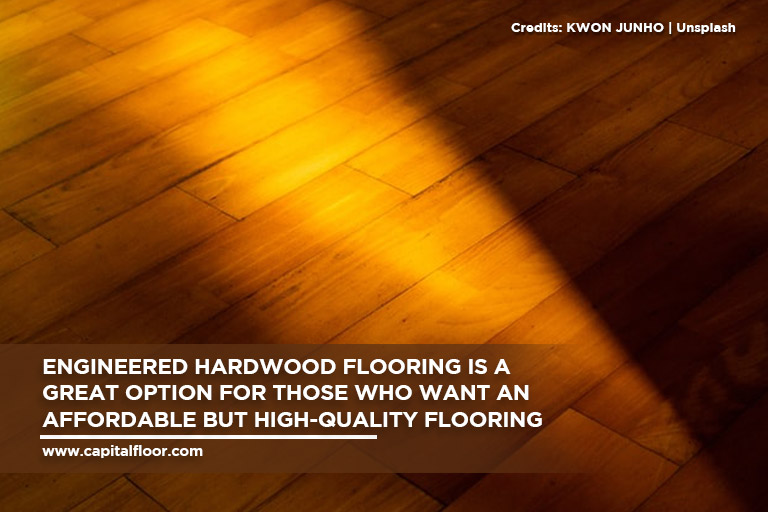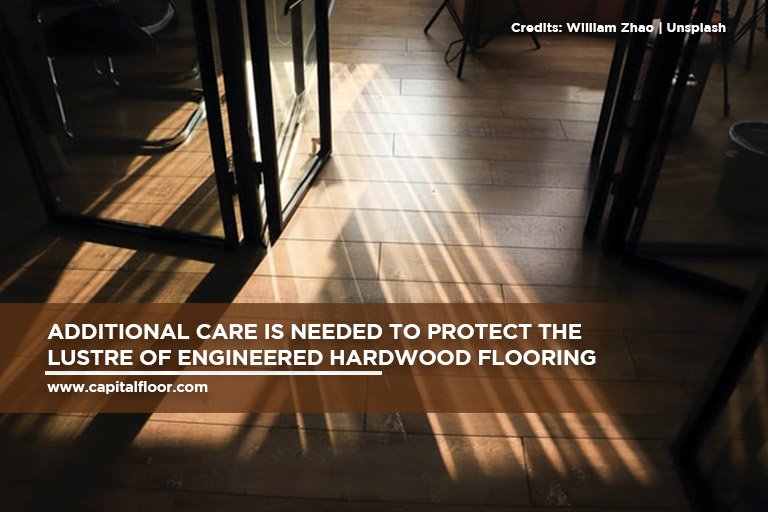Our showroom is open to the public. Please click HERE for more details.
Our showroom is open to the public. Please click HERE for more details.
In addition to aesthetics, your floor plays an integral part in the structural well-being of your home. There are a variety of flooring options to choose from. Among these are solid hardwood flooring and engineered hardwood flooring.
What is the difference and why is engineered hardwood flooring becoming such a popular option?
Engineered hardwood flooring, unlike solid wood, has a solid wood top or “wear” layer that covers a multilayered plywood core. The upper surface and core thicknesses will vary based on the design and manufacturer. Engineered wood planks can be as thin as one-quarter inch (6.35 mm) or as thick as a three-quarter inch (19 mm).
The product’s quality is usually reflected in the thickness of the wear layer. The industry standard is between 2 and 6 mm, with a thicker wear layer suggesting a higher-end product.
Solid hardwood are long planks made of hardwood species, like maple, oak, or walnut. It is milled with tongues and grooves on opposing edges so that when mounted, the boards interlock. It’s almost always nailed to the subfloor, which is a labour-intensive process. With its solid wood construction, this flooring option may be sanded and refinished multiple times.
Engineered wood flooring resembles real hardwood in appearance, but it is made out of a thin layer of hardwood bonded to a high-quality plywood layer that provides excellent stability. A high-quality engineered wood floor can endure for 25 to 30 years and is less expensive and easier to install for DIY enthusiasts.

While solid hardwood flooring is in high demand, counterfeit hardwood is commonly used since the “real deal” is often prohibitively expensive. Engineered hardwood flooring is a great middle ground. It has a higher price tag than vinyl or imitation laminate, but it is not quite as expensive as true hardwood.
Engineered hardwood flooring is less susceptible to temperature and moisture changes than solid wood flooring because of its composite core layers. Though there may be some warping — typically if moisture issues (such as a standing pool of water) are not addressed—the overall quantity of swelling and shrinkage is significantly less than that found in a solid wood floor.
Engineered hardwood is strong and long-lasting, so it will last for many years in your home.
Engineered hardwood floors may be the way to go if you’re concerned about the environment. These floorings require less hardwood per board than solid wood floors, which could be a deciding factor if you’re looking for exotic or uncommon types of wood.
These floors are eco-friendly and sustainable because they use less harmful glue and produce little to no sawdust. However, because this varies from company to company, make sure to check the manufacturer’s environmental certifications before purchasing.
Installation of engineered hardwood flooring is significantly easier. This will save you time and cost which is why this is an extremely popular wood of choice for DIYers.
Modern engineered wood flooring, in addition to all of its unique features, has many of the same advantages as classic solid hardwood. It has a beautiful, natural appearance as an actual wood product and is available in a variety of wood species, grades, and finishes.
An engineered hardwood floor can only be sanded and refinished a few times — and occasionally only once — before the veneer layer erodes, revealing the core layers. The thickness of the veneer layer determines the number of times you can resurface.
As a result, maintaining the lustre and gloss of hardwood flooring requires a significant amount of effort. Engineered wood is no exception. It isn’t suitable for homes with pets or small children unless you are willing to maintain it on a regular basis.

This is another disadvantage that engineered hardwood has in common with ordinary hardwood. If exposed to UV rays for an extended period of time, the wood will fade, and this is not a problem that can be easily remedied.
Thankfully, you can reduce the chance of fading by closing your drapes or covering more exposed sections with rugs. Furthermore, aftermarket coatings may reduce the likelihood of fading, but they come at an additional cost.
While it has some downsides, modern innovations in engineered hardwood flooring have made it a more popular option in modern homes. If you’re looking for flooring options for your new home, engineered hardwood floors are the way to go.
There are a wide array of options to choose from when it comes to choosing the right flooring variety for you. If you need engineered hardwood flooring for your Toronto home, contact the experts at Capital Hardwood Flooring. Dial 416-536-2200 or send us an email at [email protected] for a quote.